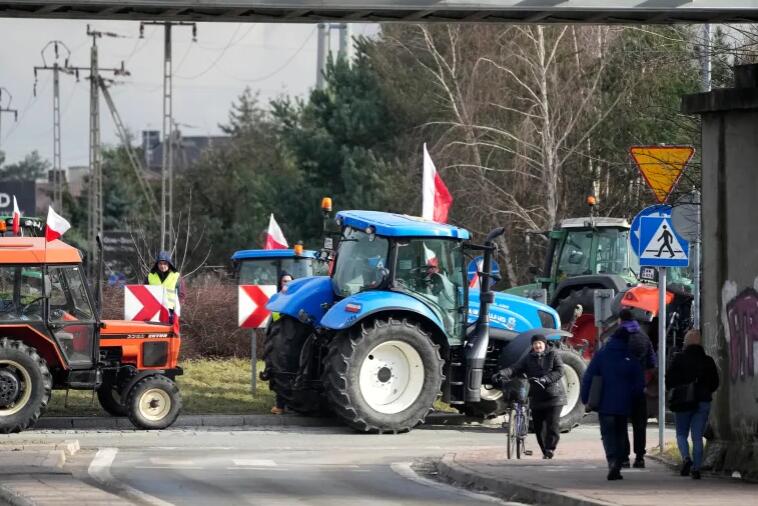Polish farmers have blocked border crossings with Ukraine, spilled Ukrainian grain and burned tyres as they intensified a nationwide protest against the import of Ukrainian foods and European Union environmental policies.
Farmers from Spain to Italy to Belgium have been protesting in recent weeks, worried that the EU’s Green Deal plan to place limits on the use of chemicals and greenhouse gas emissions will result in a reduction in production and income.
They were also revolting against competition from non-EU countries, in particular Ukraine, a large producer of agricultural goods.
Polish farmers drove their tractors on Tuesday through Gdansk, Krakow and other cities, honking their horns in the noisy protest. They said their action would become ever more dramatic until their demands are met. Elsewhere they blocked the entrances to highways and about 100 roads to the Ukrainian border.
They want Prime Minister Donald Tusk’s government to withdraw Poland from the Green Deal and to stop the import of agricultural imports from Ukraine. A sign on one tractor in Gdansk accused the government of caring more about Ukraine than Polish farmers. “Such a policy ruins farmers,” another sign said.
The farmers spilled Ukrainian grain in Medyka, a Polish border town, leading to sharp criticism from the Ukrainian ambassador to Poland.
“We strongly condemn the spilling of Ukrainian grain by protesters in Medyka,” Ambassador Vasyl Zvarych wrote on X, formerly Twitter, adding, “The police should react decisively and punish those who break the law. It is also a lack of respect for the work of Ukrainian farmers in conditions of Russian aggression, towards themselves and other people.”
The protests are a growing source of tensions between Ukraine and neighbours across its Western border which support its efforts to fight off Russia’s invasion but are facing pressure from farmers.
The farmers say Ukrainian grain and other food imports are damaging their livelihoods by creating a glut in the market that pushes down prices.
“I’m here to get rid of the restrictions introduced by the European Union regarding fallow land, the Green Deal and above all to stop Ukrainian food flowing in,” Tomasz Golak, who runs an animal and cereal farm, told the news agency AFP.
“This year, wheat is selling for half the price it did last year,” he said.
The 27-nation EU last month eased restrictions that obliged farmers to keep part of their land fallow and this month extended that exemption under pressure from protests.
Roads into EU member Poland have been an export lifeline for Ukraine, particularly its agriculture sector, after the 2022 Russian invasion complicated major trading routes through the Black Sea.
Ukraine’s President Volodymyr Zelenskyy singled out the protesting Polish farmers in his nightly address Monday, saying their actions indicated an “erosion of solidarity”.
“Near Kupiansk, close to the Russian border, where enemy artillery does not cease, news from the border with Poland seems outright mocking,” said Zelenskyy.
According to Zelenskyy, Ukraine exports only 5 percent of its grains through the Polish border. “So in reality, the situation is not about grain, but rather about politics,” he said.
In response to the protests, Ukrainian drivers started a rally near three crossing points with Poland, the Ukrainian media outlet Suspilne reported. “The blockade of Ukraine is a betrayal of European values,” a sign on one truck said.
More protests are expected on Thursday in central Europe.

